ANU Students March in Protest of Australia Day as Tent Embassy Marks Its 50th Anniversary
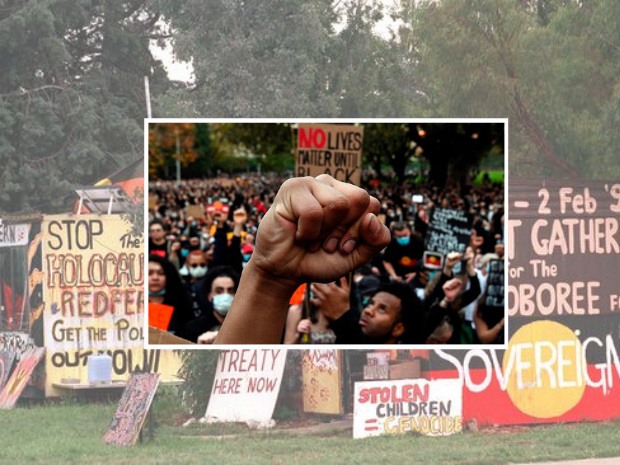
By Eleanor Ellis
Photography by Eleanor Ellis
CW: Genocide, colonisation, racism, discrimination, deaths in custody
On Tuesday 26 January 2022, hundreds gathered in Garema Place and marched to the Aboriginal Tent Embassy, commemorating the Embassy’s 50th anniversary, and protesting “Australia Day” celebrations.
The march occurred on the second day of a three-day event organised by the Aboriginal Tent Embassy to “honour and mourn our past, celebrate our survival, and strategise for the next 50 years”.
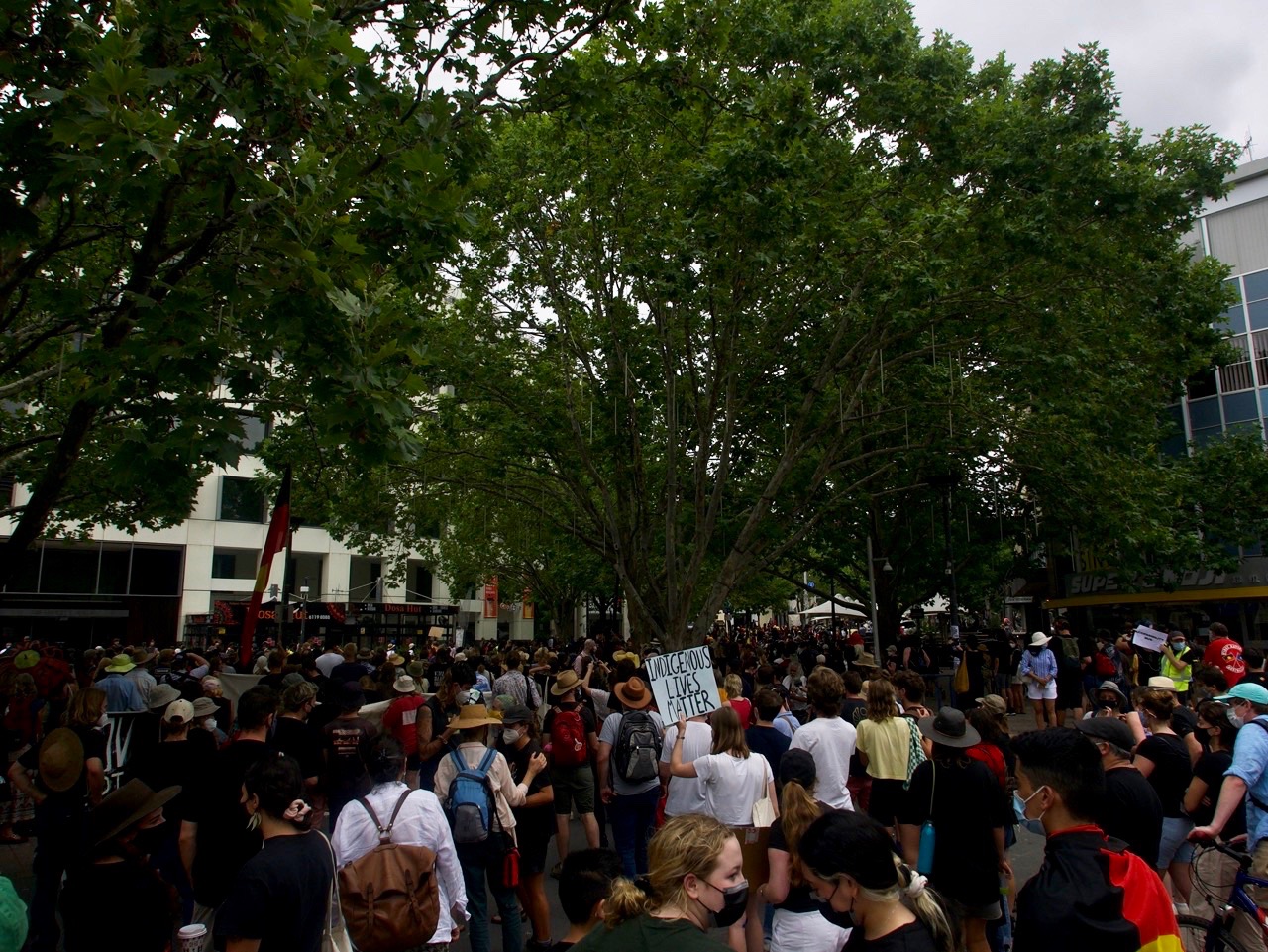
Dating back to 1972, the Tent Embassy is now “one of the world’s longest continuing protest sites”. It was established by four Aboriginal men, Billie Craigie, Michael Anderson, Bertie Williams and Tony Coorey,who set up a beach umbrella opposite Parliament House (Old Parliament House today) in protest of the government’s refusal to grant independent ownership of traditional land to Indigenous People. According to Coorey, the name reflected how the McMahon government had made Indigenous Australians “aliens in our own land; so, like other aliens, we needed an embassy”. It was formed, removed, and reformed several times before being permanently established in 1992.
The day began with several speeches, including one by Ruby Wharton from the community of Cunnamulla, Kunja country, a member of the Warriors of the Aboriginal Resistance and self-described “Tent Embassy Baby”. Wharton denounced the lack of governmental and judicial response to Indigenous deaths in custody – 500 since the 1991 Royal Commission – and violence perpetrated by police and the legal system as cries of “shame” were heard from protestors. Her father, Wayne Wharton, also spoke about land rights and sovereignty, as well as the importance of activism.
He reminded protesters that “you make the change. Turn up in the street meetings, demand justice… Every time a call goes out for help, stand with them.”
Following the speeches in Garema Place, people marched to the Tent Embassy, passing City Hill, across Commonwealth Avenue Bridge. The rest of the day included speeches, panels, exhibitions, stalls, and performances by local artists. On 24 and 25 February, The Tent Embassy ran workshops discussing land rights, supporters and allies, governance, deaths in custody, governance, and sovereignty.
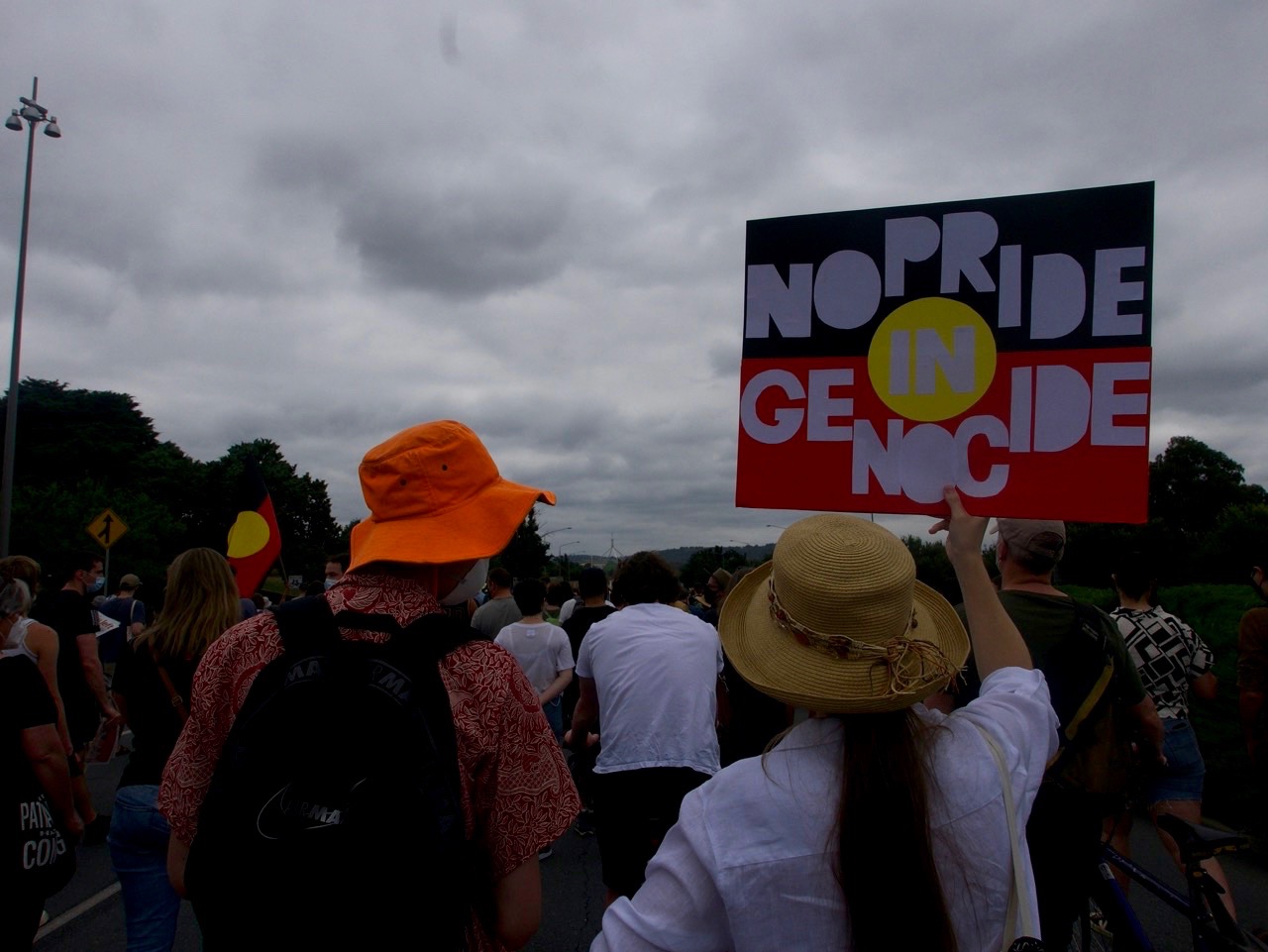
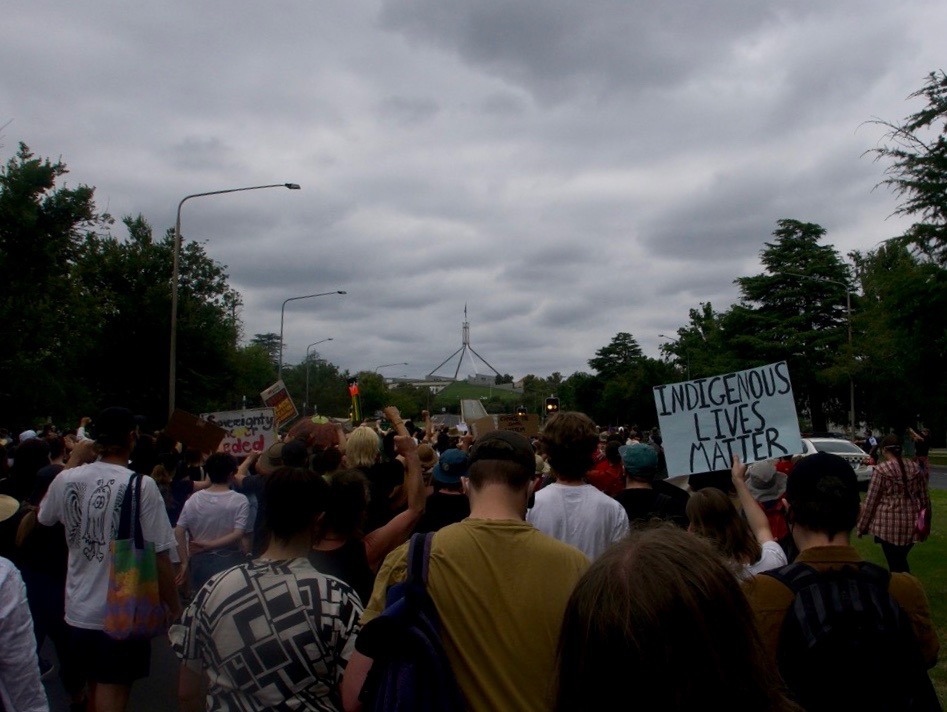
Last year, the ANUSA Indigenous Department organised a contingent and campaign for Invasion Day 2021, and have previously run a number of other campaigns to push issues facing Indigenous people into the spotlight. The 2018 “Because of Her, We Can!” campaign showcased Aboriginal and Torres Strait Islander women “who have come before us to forge the path we now walk”, raising awareness around their contributions to Indigenous communities. The 2017 campaign, “From Little Things Big Things Grow” featuring Gurindji man Vincent Lingiari and the Wave Hill Walk-Off in 1996 highlighted “how one initial act of demanding pay for labour can lead to huge social and political movements of rightful land ownership”.
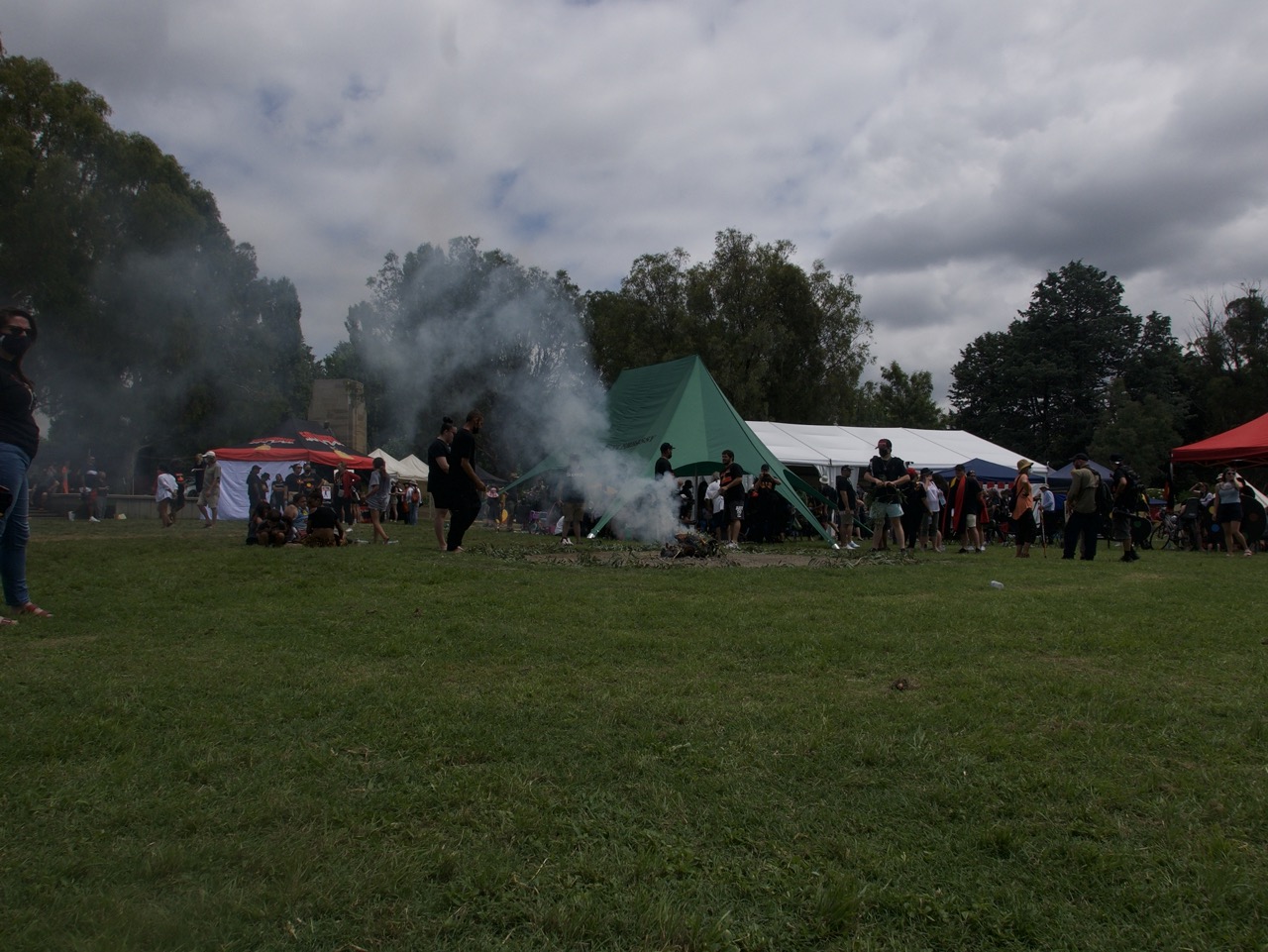
Regarding the Department’s plans for 2022, ANUSA Indigenous Officer Katchmirr Russell, stated “future events/campaigns/initiatives are still in planning phases and will be dependent on our already low capacity.”
The National Union of Students expressed their support and respect towards “the survival concerts and activities of Invasion Day held across communities”, “the voice of First Nation peoples and will listen to ensure change”, and “the ongoing activism of First Nation peoples for authentic recognition of the histories”. The NUS “encourages all fellow students to listen to Aboriginal voices while doing research into the history of Australia” and the impacts felt across Aboriginal communities of “invasion, colonisation, racism, and discrimination”.
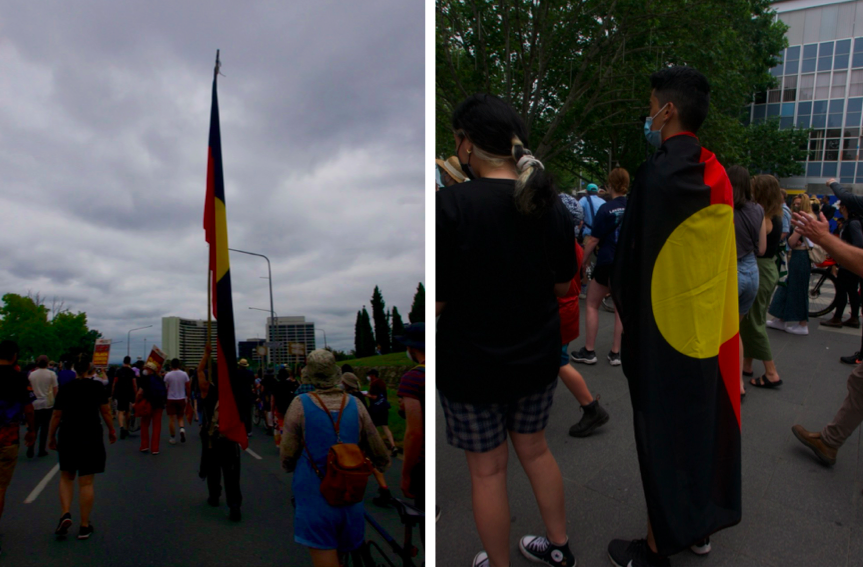
The ANU Indigenous Department Facebook posted a series of infographics about “How to be an Ally” on 17 January, advising students to “attend rallies, marches and services”, “learn what country you’re on”, “donate to Aboriginal and/or Torres Strait Islander mutual aid fund”, and “support Blak Businesses” and media, recommending “Clothing the Gap”, “Haus of Dizzy”, “Coming Out Blak”, and “Unapologetically Blak”.
The post ended with a reminder that “allyship does NOT end after January 26th”, echoing the words of Cherly Buchanan, from the Guwamu (Kooma) nation, who also spoke before the march: “what matters is what you do after this”.
The full livestream of the speeches can be accessed on the Aboriginal Tent Embassy Facebook page.
The Aboriginal Tent Embassy website also has ways to get involved through petitions, volunteering, purchasing clothing, fundraising, donating, and attending events. Past events organised by the Tent Embassy include the 2021 Invasion Day March, “The Big Peace Gathering Of First Nations Elders” in 2020, and “First Nations Rise Up – National Call Out” in 2017.
Graphics by Mady Hall
Support services:
ANU Counselling 02 6125 2442
ANU 24/7 Wellbeing & Support: 24/7 1300 050 327 or 0488 884 170
ANU Security: 02 6125 5549
Indigenous Department: [email protected]
BIPOC Department: [email protected]
Lifeline: 13 11 13
Beyond Blue: 1300 22 4646









